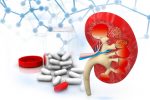Discontinuing Soliris Is Safe for Certain aHUS Patients

Treatment with Soliris (eculizumab) may be discontinued with close monitoring in people with atypical hemolytic uremic syndrome (aHUS) whose disease is in remission for at least six months — providing their kidney function remains stable — or in those who have developed end-stage kidney disease, a small study suggests.
The findings also indicated that patients with treatment-induced HUS are not likely to experience relapses after discontinuing Soliris therapy.
“[Soliris] treatment has dramatically improved the outcomes and prognosis of aHUS,” the researchers wrote, noting, however, that “treatment discontinuation may be considered at least six months after hematologic [blood-related] remission” in these specific patient populations.
The study, “Discontinuation of Eculizumab treatment after hematological remission in patients with atypical and drug-induced hemolytic uremic syndrome” was published in the Romanian Journal of Internal Medicine.
aHUS is a rare disease in which the dysregulation of the complement cascade, a part of the immune system, causes blood clots to form inside small blood vessels. These clots cause damage to internal organs, especially the kidneys.
Most people with aHUS have inherited mutations in genes that regulate the function of the complement cascade. Yet, mutations alone are usually not sufficient to trigger the onset of the condition; in most cases, a trigger event, such as an infection, also is necessary.
Marketed by Alexion Pharmaceuticals, now part of AstraZeneca, Soliris is one of the two medications currently approved in the U.S. to treat aHUS. It is an antibody that works by binding to C5, a specific component of the complement cascade. By doing so, Soliris halts complement activation, which in turn prevents excessive blood clotting.
However, the optimal treatment duration with Soliris is unknown.
Now, a team led by researchers at the Gazi University Faculty of Medicine, in Turkey, conducted a single-center observational study to evaluate the effectiveness of Soliris and plasma exchange therapy in inducing remission and improving kidney function in people with aHUS. Of note, plasma exchange therapy is a form of treatment in which plasma — the liquid portion of blood — is replaced.
The effects of both treatments on the number of relapses and deaths were evaluated. Patients were deemed to have had a relapse whenever their initial symptoms returned after having started treatment with Soliris.
Additionally, the researchers evaluated the clinical outcomes of patients who discontinued treatment with Soliris.
A total of 18 adults with aHUS — nine men and nine women — with a median age of 30 were enrolled in the study. Among them, 13 were given Soliris and five received plasma exchange therapy. Three patients had treatment-induced HUS, and another three pregnancy-associated disease. In five patients, the disorder was triggered by an infection.
Soliris, administered intravenously (into-the-vein), was given when platelet counts fell under a certain threshold (150,000 platelets per microliter of blood) after five sessions of plasma exchange therapy or its discontinuation. It also was given to patients who continued to undergo hemodialysis or showed no improvements in kidney function.
Patients were given Soliris at a weekly dose of 900 mg for four weeks, or about one month, followed by 1,200 mg every two weeks thereafter.
Upon remission, a clinical evaluation was conducted to assess whether treatment with Soliris was still required or could be discontinued. In cases of discontinuation, patients were closely monitored for signs of disease recurrence. Overall, the patients were followed for a median of 15.5 months.
Among the 18 patients, four achieved disease remission following plasma exchange therapy alone, but one patient died after completing three sessions. Soliris was given to 13 patients, and no deaths were recorded.
After one year of follow-up, data were available for 12 patients: three who underwent plasma exchange therapy and nine who were treated with Soliris.
Complete kidney function recovery was seen within three months in one patient given plasma exchange therapy and in three treated with Soliris. Such recovery was defined by blood creatinine levels under 1.1 mg/dL and protein content in the urine below 500 mg per day. Creatinine is an indicator of kidney function.
Improvements in kidney function — defined by the same criteria, along with an increase in the estimated glomerular filtration rate (eGFR), another indicator of kidney function — were seen in two of the three patients (66%) given plasma exchange therapy and in five of the nine patients (56%) treated with Soliris.
Four of the nine patients treated with Soliris developed end-stage kidney disease.
Blood parameters were normalized in all patients treated with Soliris. Disease remission was achieved after a median of 10 days, with a range of 3–27 days.
Soliris was discontinued in nine patients. Five continued to receive the therapy for at least three months at the time of the study’s preparation. One of the patients, who had a mutation in the C3 gene, experienced a relapse within three months after discontinuing Soliris.
None of the patients with treatment-induced HUS experienced a relapse after discontinuing Soliris treatment, the data showed.
Overall, these findings suggest that Soliris is a “life saving therapy that provides favorable hematological [blood-related] and renal outcomes,” the researchers wrote.
According to researchers, Soliris discontinuation can be considered only within a minimum of six months after remission in patients with stable kidney function or in those without any prospects of achieving kidney function improvements.
Moreover, they noted that patients with treatment-induced HUS seem not “to develop disease relapse in the long term.”








